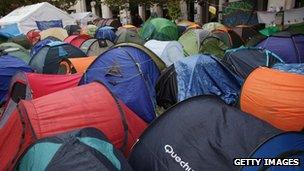Archbishop of Wales 'would not close doors to protest'
- Published
The Archbishop of Wales has said he would allow anti-capitalist protesters to shelter overnight in Llandaff Cathedral if they set up camp outside.
As long as protesters did not disrupt the cathedral's life, Dr Barry Morgan said they would be welcomed inside.
His comments came after Occupy activists outside St Paul's Cathedral were served with eviction notices.
In a wide-ranging BBC Wales interview, he said he hoped Llandaff could stay open in similar circumstances.
St Paul's closed it doors when the Occupy London Stock Exchange movement set up its protest camp last month in an attempt to highlight inequality and greed.
Asked in an interview for BBC Wales' Politics Show, Dr Morgan said: "I would hope that if this were to happen outside Llandaff Cathedral, I would hope that we would keep the services going, keep the cathedral open even though you might have to trip over people to get in there.
"And I hope that they would understand that it stands there as a place of worship, stands there as a place of dialogue, and that they would be welcome to come in.
"So I would hope the doors would remain open."
Asked if he would invite protestors inside for warmth and security, he said: "Yes of course.
"The cathedral during winter months is heated anyway.
"Perhaps it's easy for me to say this because the dean is in charge of the cathedral.
'Peaceful protest'

Tents of protesters outside St Paul's
"But I would hope that if people wanted to make peaceful protest and that didn't disrupt the life of the cathedral as far as worship was concerned that we would be as accommodating as possible towards them."
There was a "moral blindness" in bankers enjoying lavish bonuses after some banks had gone to the wall, he said.
The extremes of wealth and poverty in society suggested "perhaps we in this country have got it wrong".
The Dean of St Paul's Cathedral, along with two other senior members, resigned following the establishment of the camp.
Protesters set up an Occupy Cardiff camp as part of the global movement against banking and big business last Friday but it was broken up within hours police on as they were breaking by-laws.
Ruth Gledhill, religious correspondent for The Times, said Dr Morgan's views matched those of the clergy at St Paul's.
Tragic resignations
"As we know, the St Paul's chapter was divided over its initial response to the protest, which was an unexpected event just landing on its doorstep," Ms Gledhill told BBC Radio Wales.
"They struggled to cope with it because they were caught in the faultline that the church is on actually as the established church in England, which is the faultline between God and man.
"Do they serve their parish if you like, which is of course the financiers, the people, many of whom are responsible for the present crisis, or certainly played a part in it, or do they serve the poor and needy in the way that Christ spells out in the gospels?"
She said that was the line the clergy really struggled to find at the beginning of the crisis, and "we saw the fallout from that with two incredibly tragic resignations".
- Published17 November 2011